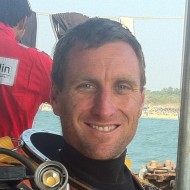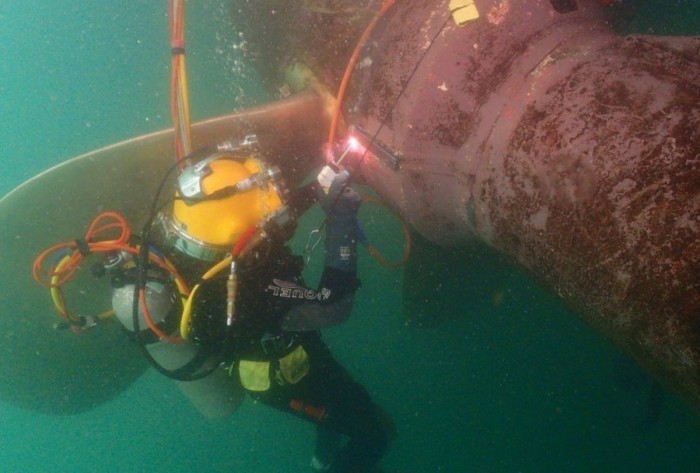Diver
Kairukuruku
Alternative titles for this job
Commercial divers develop and maintain underwater structures and do research for scientists. Recreational divers teach scuba diving and may carry out marine searches and rescues.
Pay
Recreational divers work full-time and usually earn
$49K per year
Commercial divers work on short-term contracts and usually earn
$350-$1200 per day
Source: Academy of Diving, Subsea Training Centre and NZ Diving & Salvage, 2019.
Job opportunities
Pay
Pay for divers varies depending on skills, experience and the type of diving they do.
Recreational divers are usually employed full time and paid a fixed salary.
- Recreational divers usually earn minimum wage or a little more.
Commercial divers usually work on short-term contracts and are paid a daily rate. Some commercial divers are employed full time and paid a fixed salary.
- Newly qualified commercial divers working onshore usually earn between $350 and $400 a day.
- Experienced commercial divers or supervisors working offshore can earn between $800 and $1,200 a day.
Sources: Academy of Diving, 2019; Subsea Training Centre 2019; and NZ Diving & Salvage, 2019.
- PAYE.net.nz website - use this calculator to convert pay and salary information
- Employment New Zealand website - information about minimum wage rates
(This information is a guide only. Find out more about the sources of our pay information)
What you will do
Divers may do some or all of the following:
- inspect, build and repair structures using underwater tools and equipment
- search underwater areas for objects, structures or criminal evidence
- manage emergency situations, including rescuing divers in distress
- clean and inspect boats or marine farm structures
- guide certified divers on underwater tours
- inspect, clean and wash diving equipment
- instruct dive students
- keep a log book to record details of diving experiences.
Skills and knowledge
Divers need to have knowledge of:
- diving techniques, and have excellent diving skills
- diving equipment, and have the ability to repair equipment that breaks down on-site
- relevant health and safety regulations
- underwater hazards such as rips and currents
- first aid and how to deal with emergencies.
Depending on their area of specialisation, divers may also need to have knowledge of:
- underwater inspection and survey techniques
- search and rescue procedures
- construction methods and materials
- underwater photography
- the behaviour of marine life.
Working conditions
Divers:
- usually work irregular hours including weekends, and may be on call
- may work off boats for days or weeks at a time, and spend long periods underwater in lakes, rivers, harbours and at sea
- may travel to work sites throughout New Zealand or in places such as Antarctica or the North Sea
- may work in extreme conditions including icy water, water with poor visibility, and in windy or changeable weather conditions which may be dangerous.
What's the job really like?

Brook McRae
Diver
Getting paid to live your dreams
“There are few jobs that give you the memorable adventures that come with a diving career,” says diver and commercial diving business owner Brook McRae.
“The bonus is getting paid to go to some amazing places. I’ve worked deep underwater in India installing and connecting big oil and gas pipelines. You live in a helium ‘space station’ and talk like a chipmunk for a month at a time!”
His construction diving skills have also been in demand around New Zealand. “I’ve done salvage work on the Rena shipwreck in Tauranga and joined pipes with huge bolts for Christchurch’s water treatment outfall.”
Brook says it’s definitely a job requiring practical skills. “It helps if you’re hands on, and have a touch of Kiwi ingenuity as you’re often thinking of solutions."
Network to get jobs
“Diving work can be a feast or famine, but roles are there for people who are proactive about finding work,” observes Brook.
And he says, “If you do well at the construction diving training school you’ll get noticed and get the jobs. Especially if you’ve got a Certificate in Construction Diving to 50m because then you can work on the heavier construction jobs like hydro dams.”
Expect to spend time away from home
Diving’s a job where you need to be away from home a lot, admits Brook. “Some jobs can go on for four to six months. So it’s best if you can fully commit, or have an understanding partner!”
Entry requirements
Commercial diver qualifications
To become a commercial diver you need to have a specific diving qualification from Subsea Training Centre.
You also need to be at least 18 years old and hold a current:
- medical clearance from the Diving Hyperbaric Medicine Service
- First Aid Certificate, renewed every three years
- CPR qualification, renewed every 12 months
- oxygen administration qualification, renewed every 12 months
- Worksafe Certificate of Competence, renewed every five years.
- Australian Diver Accreditation Scheme (ADAS) website - information for divers
- Worksafe website - guidelines for occupational (work-related) diving
Recreational diver qualifications
To become a recreational scuba diving instructor you need to be qualified to train others, and may need to complete a certain number of dives.
Secondary education
There are no specific secondary educational requirements to become a diver. However, physical education, maths, physics and workshop technology are useful.
Personal requirements
Divers need to be:
- able to remain calm in emergencies and work well under pressure
- confident and adaptable
- alert and safety conscious
- methodical and careful
- good communicators.
It pays to be safety conscious, to do all your safety checks, because you’re working underwater in near zero visibility with tools like blazing hot thermal torches that cut through metal.

Brook McRae
Diver
Useful experience
Useful experience for divers includes:
- recreational diving
- dive industry retail work
- building industry work
- engineering, fitting and welding work
- scientific work such as marine biology or oceanography
- work on boats or in the boating industry
- teaching.
Physical requirements
Divers need to have excellent fitness and health and a good level of stamina because diving can be physically demanding. They also need to be free of inner-ear problems.
Find out more about training
- Academy of Diving
- 06 356 1665 - info@academyofdiving.ac.nz - www.academyofdiving.ac.nz
What are the chances of getting a job?
Demand for divers steady
Chances of getting a job as a diver are average as diving is a small occupation, but there are opportunities due to a steady turnover of workers.
According to the Census, 198 divers worked in New Zealand in 2018.
Regular work in onshore commercial diving
Your best chance of getting regular diving work is to do onshore diving with a commercial operator. This work usually involves maintaining, repairing and upgrading infrastructure such as ports.
Opportunities in biosecurity and aquaculture fields
Regional councils have received increased funding for dive teams for marine biosecurity because the Government's Biosecurity 2025 strategy focuses on improving management of invasive pests and diseases.
The aquaculture industry is also expanding its operations, which will create more opportunities for divers to do underwater inspections, maintenance and repairs.
Types of employers varied
Divers are employed across a range of industries. Divers may work for:
- commercial diving contractors
- scuba diving instructor or tourism companies
- engineering companies
- aquaculture businesses
- aquariums and marine science research institutes
- offshore oil rig operators
- media, photography or film companies
- ship-building, repair and salvage firms.
The Royal New Zealand Navy, New Zealand Police, and New Zealand Customs Service also have dive teams.
Sources
- Academy of Diving website, accessed January 2020, (www.academyofdiving.ac.nz).
- Bishop, S, technical adviser, NZ Underwater Association, careers.govt.nz interview, June 2018.
- Edwards, A, careers.govt.nz interview, Subsea Training Centre, January 2020.
- Fergus, A, payroll officer, NZ Diving and Salvage, careers.govt.nz interview, January 2020.
- Fergus, S, general manager, NZ Diving & Salvage, careers.govt.nz interview, June 2018.
- Hannaford, K, owner, DiveCo Ltd, careers.govt.nz interview, June 2018.
- Lash, H, biosecurity officer, Bay of Plenty Regional Council, careers.govt.nz interview, June 2018.
- Lines-MacKenzie, J, 'Subsea Training Centre Can't Keep Up With Demand For Divers', July 2018, (www.stuff.co.nz).
- Stats NZ, '2018 Census Data', 2020.
- Subsea Training Centre website, accessed January 2020, (www.subsea.nz).
(This information is a guide only. Find out more about the sources of our job opportunities information)
Progression and specialisations
Divers may progress to set up their own diving business.
Divers may specialise in a number of roles including:
- Commercial Diver
- Commercial divers may work onshore or offshore and usually work for construction, engineering or science companies.
- Recreational Diver or Diving Instructor
- Recreation divers usually teach various recreational scuba diving skills.
- Hazmat Diver
- Hazmat divers are a specific kind of commercial diver and usually work in hazardous underwater conditions.
- Naval, Police or Military Diver
- Naval, police or military divers perform a variety of underwater tasks for the institutions they work for.
- Aquaculture Diver
- Aquaculture divers work for aquaculture farms which reproduce and harvest species such as mussels, oysters and salmon.
- Media, Film or Photographic Diver
- Media divers usually work for production companies and specialise in capturing underwater images.
- Search and Rescue Diver
- Rescue divers are commercial or recreational divers qualified to help save people from dangerous underwater situations.
Last updated 31 March 2025


